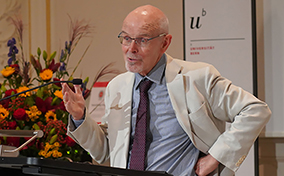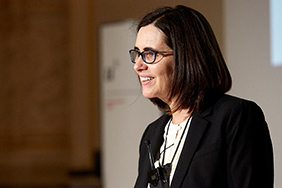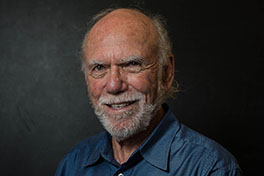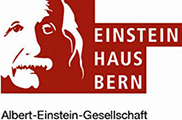Past Lectures
You missed the past Einstein Lectures? You can find information about the guests, the presenters in pictures and words on these pages.
Einstein Lectures 2024

Susan R. Wolf
The Einstein Lectures 2024 were dedicated to the nature of human beings. The renowned American philosopher Susan R. Wolf discussed the question of what makes us human. Susan R. Wolf held the prestigious Edna J. Koury Distinguished Professorship of Philosophy at the University of North Carolina at Chapel Hill until her retirement in 2022. In 2022, Wolf received the international Lauener Prize in Bern for outstanding work in analytic philosophy.
Einstein Lectures 2023

Maryna Viazovska
Wie muss man gleich grosse Kugeln anordnen, damit der leere Raum zwischen ihnen so gering wie möglich ist? An drei Abenden referierte die ukrainische Mathematikerin Maryna Viazovska zu diesem Thema. Viazovska ist Professorin für Zahlentheorie an der EPF Lausanne. 2022 wurde sie für ihre Arbeit über das Stapeln von Kugeln in den Dimensionen 8 und 24 mit einer Fields-Medaille ausgezeichnet, die auch als «Nobelpreis der Mathematik» gilt.
Einstein Lectures 2022

Didier Queloz
Sind wir allein im Universum? Gibt es Leben auf anderen Planeten? Im Jahr 1995 entdeckten Michel Mayor und Didier Queloz von der Universität Genf das Objekt «51 Pegasi b», als ersten Planeten ausserhalb unseres Sonnensystems. Im Jahr 2019 erhielten sie für diese bahnbrechende Entdeckung den Physik-Nobelpreis. Heute ist Didier Queloz Professor an der ETH Zürich und der Universität in Cambridge, UK, und Fellow am Trinity College, Cambridge, UK.
Einstein Lectures 2021

Philip Pettit
What makes mankind human? Probably quite simply: that they are able to ask themself this question. But how did it come that a human became such a being endowed with spirit? Philip Pettit tries as a philosopher to give an answer to this question, with the means of a thought experiment - which Einstein also loved very much.
Einstein Lectures 2019

Prof. Shafi Goldwasser
Mathematician and computer scientist at the same time, Professor Shafi Goldwasser is a pioneer of modern cryptography. For her groundbreaking works she was awarded the A.M. Turing Award, the ”Nobel Prize of Computer Science“, in 2012 (together with Silvio Micali). Shafi Goldwasser is Director of the Simons Institute for the Theory of Computing at the University of California in Berkeley, USA.
Einstein Lectures 2018

Prof. em. Barry Barish
Barry Barish und seinem Team ist gelungen, was selbst Albert Einstein für unmöglich hielt: Sie haben Gravitationswellen direkt nachgewiesen. Diese Schwingungen des leeren Raumes selbst entstehen beispielweise, wenn sich zwei Schwarze Löcher so nahe kommen, dass sie miteinander verschmelzen. Der 82-jährige Barry Barish vom California Institute of Technology (Caltech) war jahrelang wissenschaftlicher Leiter des Interferometer Gravitationswellen-Observatoriums (LIGO), wo es im Jahr 2015 mit einem extrem sensitiven Detektor erstmals gelang, Gravitationswellen direkt nachzuweisen. 2017 wurde ihm und seinen Kollegen Kip Thorne und Rainer Weiss dafür der Nobelpreis für Physik verliehen.

